Entrepreneurship & Small Business Management: Unit 9 ASDA Analysis
VerifiedAdded on 2022/12/14
|22
|6701
|78
Report
AI Summary
This report provides an analysis of entrepreneurship and small business management, focusing on their impact on the UK economy. It examines different types of entrepreneurial ventures, their similarities and differences, and their relation to the typology of entrepreneurship. The report uses ASDA as a case study to illustrate key concepts. It discusses the significant role of micro and small businesses in the UK economy, supported by relevant data and statistics, and highlights the importance of small businesses and start-ups in the social economy, particularly in driving employment rates and fostering competition. The study also touches upon the traits and skills of successful entrepreneurs and the impact of their background and experience on their entrepreneurial journey. This document is available on Desklib, a platform offering a variety of study resources for students.

Unit 9 - Entrepreneurship and
Small Business Management
Small Business Management
Paraphrase This Document
Need a fresh take? Get an instant paraphrase of this document with our AI Paraphraser
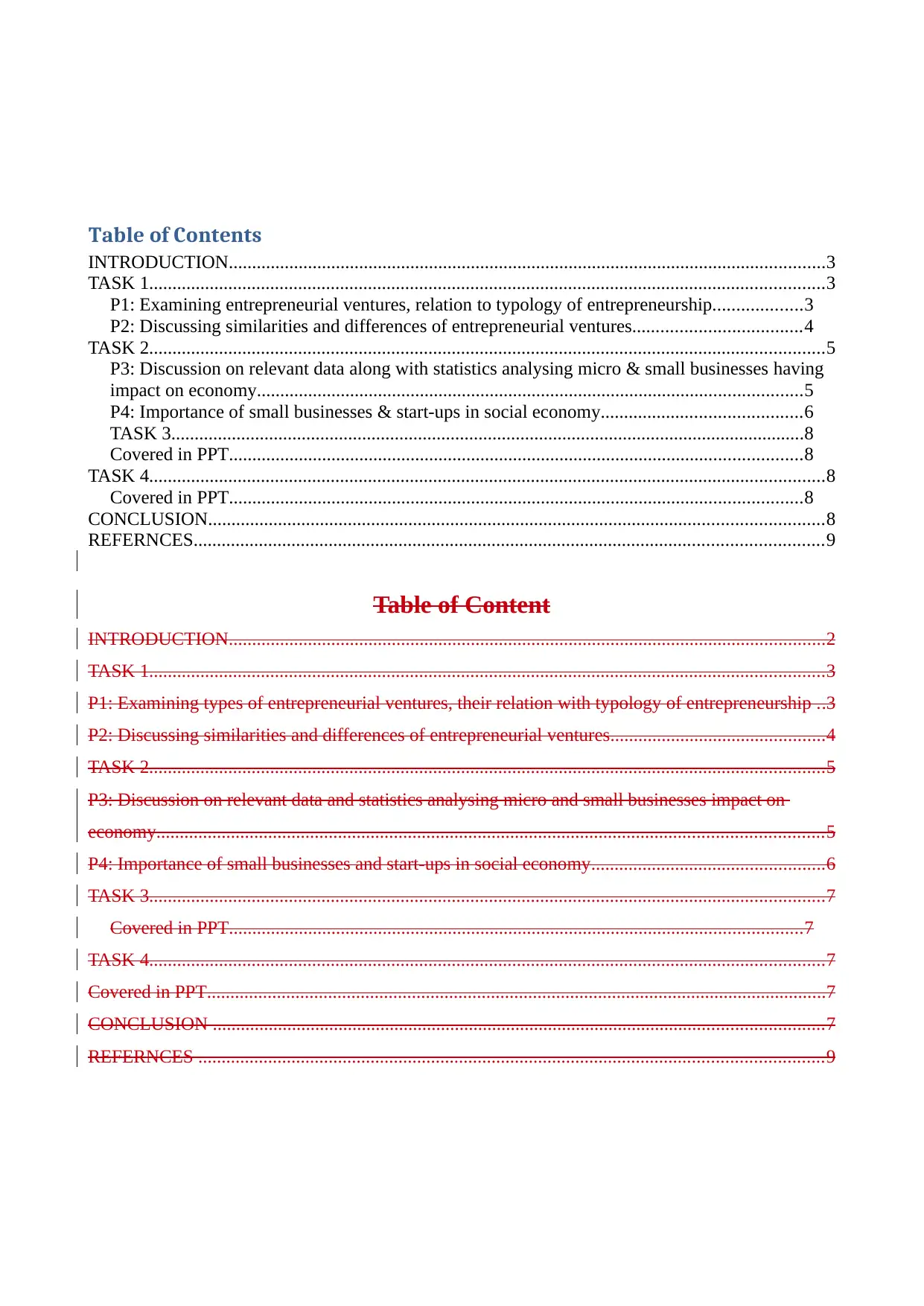
Table of Contents
INTRODUCTION................................................................................................................................3
TASK 1.................................................................................................................................................3
P1: Examining entrepreneurial ventures, relation to typology of entrepreneurship...................3
P2: Discussing similarities and differences of entrepreneurial ventures....................................4
TASK 2.................................................................................................................................................5
P3: Discussion on relevant data along with statistics analysing micro & small businesses having
impact on economy.....................................................................................................................5
P4: Importance of small businesses & start-ups in social economy...........................................6
TASK 3........................................................................................................................................8
Covered in PPT...........................................................................................................................8
TASK 4.................................................................................................................................................8
Covered in PPT...........................................................................................................................8
CONCLUSION....................................................................................................................................8
REFERNCES.......................................................................................................................................9
Table of Content
INTRODUCTION................................................................................................................................2
TASK 1.................................................................................................................................................3
P1: Examining types of entrepreneurial ventures, their relation with typology of entrepreneurship ..3
P2: Discussing similarities and differences of entrepreneurial ventures..............................................4
TASK 2.................................................................................................................................................5
P3: Discussion on relevant data and statistics analysing micro and small businesses impact on
economy...............................................................................................................................................5
P4: Importance of small businesses and start-ups in social economy..................................................6
TASK 3.................................................................................................................................................7
Covered in PPT...........................................................................................................................7
TASK 4.................................................................................................................................................7
Covered in PPT.....................................................................................................................................7
CONCLUSION ...................................................................................................................................7
REFERNCES ......................................................................................................................................9
INTRODUCTION................................................................................................................................3
TASK 1.................................................................................................................................................3
P1: Examining entrepreneurial ventures, relation to typology of entrepreneurship...................3
P2: Discussing similarities and differences of entrepreneurial ventures....................................4
TASK 2.................................................................................................................................................5
P3: Discussion on relevant data along with statistics analysing micro & small businesses having
impact on economy.....................................................................................................................5
P4: Importance of small businesses & start-ups in social economy...........................................6
TASK 3........................................................................................................................................8
Covered in PPT...........................................................................................................................8
TASK 4.................................................................................................................................................8
Covered in PPT...........................................................................................................................8
CONCLUSION....................................................................................................................................8
REFERNCES.......................................................................................................................................9
Table of Content
INTRODUCTION................................................................................................................................2
TASK 1.................................................................................................................................................3
P1: Examining types of entrepreneurial ventures, their relation with typology of entrepreneurship ..3
P2: Discussing similarities and differences of entrepreneurial ventures..............................................4
TASK 2.................................................................................................................................................5
P3: Discussion on relevant data and statistics analysing micro and small businesses impact on
economy...............................................................................................................................................5
P4: Importance of small businesses and start-ups in social economy..................................................6
TASK 3.................................................................................................................................................7
Covered in PPT...........................................................................................................................7
TASK 4.................................................................................................................................................7
Covered in PPT.....................................................................................................................................7
CONCLUSION ...................................................................................................................................7
REFERNCES ......................................................................................................................................9

⊘ This is a preview!⊘
Do you want full access?
Subscribe today to unlock all pages.

Trusted by 1+ million students worldwide
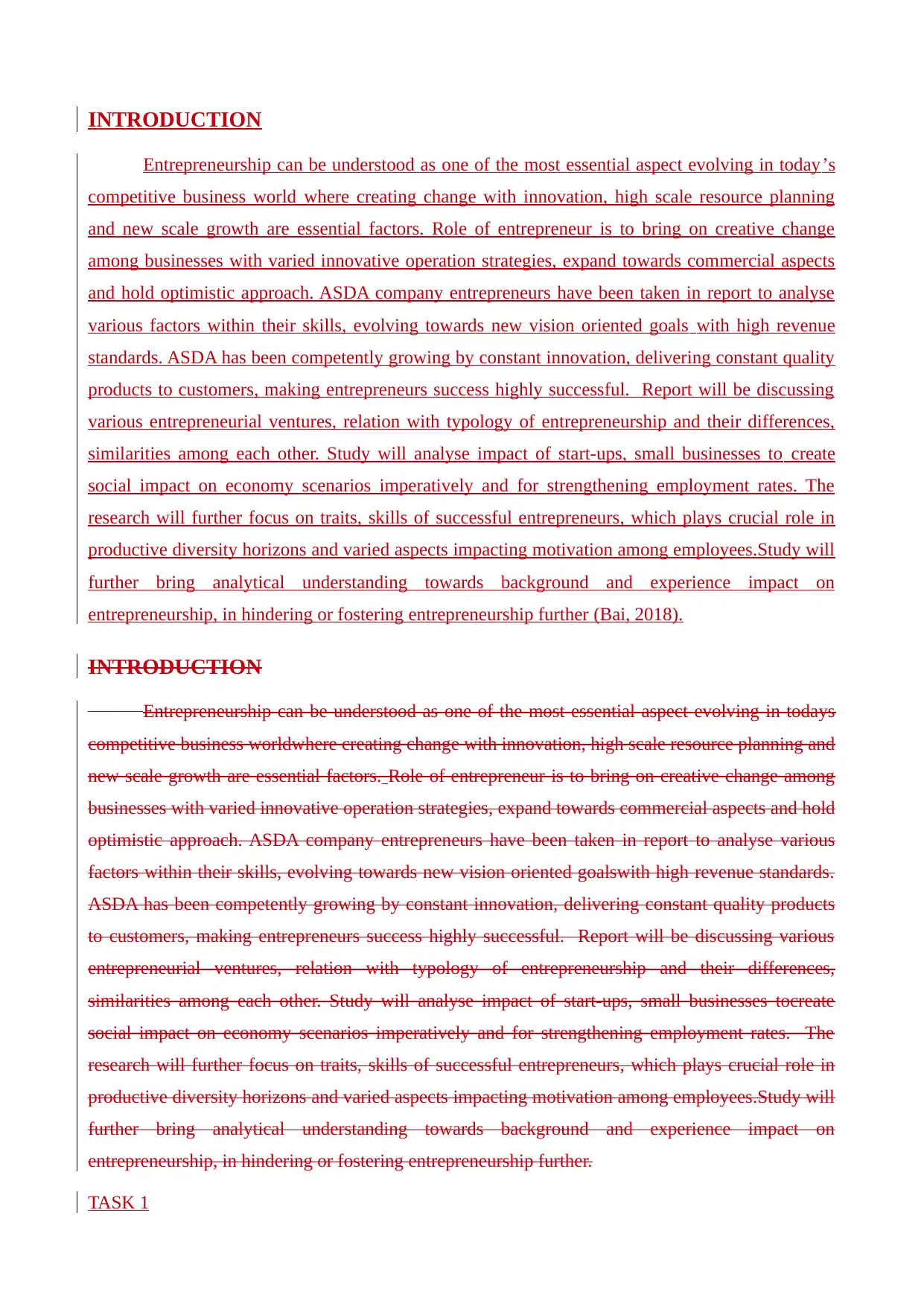
INTRODUCTION
Entrepreneurship can be understood as one of the most essential aspect evolving in today’s
competitive business world where creating change with innovation, high scale resource planning
and new scale growth are essential factors. Role of entrepreneur is to bring on creative change
among businesses with varied innovative operation strategies, expand towards commercial aspects
and hold optimistic approach. ASDA company entrepreneurs have been taken in report to analyse
various factors within their skills, evolving towards new vision oriented goals with high revenue
standards. ASDA has been competently growing by constant innovation, delivering constant quality
products to customers, making entrepreneurs success highly successful. Report will be discussing
various entrepreneurial ventures, relation with typology of entrepreneurship and their differences,
similarities among each other. Study will analyse impact of start-ups, small businesses to create
social impact on economy scenarios imperatively and for strengthening employment rates. The
research will further focus on traits, skills of successful entrepreneurs, which plays crucial role in
productive diversity horizons and varied aspects impacting motivation among employees.Study will
further bring analytical understanding towards background and experience impact on
entrepreneurship, in hindering or fostering entrepreneurship further (Bai, 2018).
INTRODUCTION
Entrepreneurship can be understood as one of the most essential aspect evolving in todays
competitive business worldwhere creating change with innovation, high scale resource planning and
new scale growth are essential factors. Role of entrepreneur is to bring on creative change among
businesses with varied innovative operation strategies, expand towards commercial aspects and hold
optimistic approach. ASDA company entrepreneurs have been taken in report to analyse various
factors within their skills, evolving towards new vision oriented goalswith high revenue standards.
ASDA has been competently growing by constant innovation, delivering constant quality products
to customers, making entrepreneurs success highly successful. Report will be discussing various
entrepreneurial ventures, relation with typology of entrepreneurship and their differences,
similarities among each other. Study will analyse impact of start-ups, small businesses tocreate
social impact on economy scenarios imperatively and for strengthening employment rates. The
research will further focus on traits, skills of successful entrepreneurs, which plays crucial role in
productive diversity horizons and varied aspects impacting motivation among employees.Study will
further bring analytical understanding towards background and experience impact on
entrepreneurship, in hindering or fostering entrepreneurship further.
TASK 1
Entrepreneurship can be understood as one of the most essential aspect evolving in today’s
competitive business world where creating change with innovation, high scale resource planning
and new scale growth are essential factors. Role of entrepreneur is to bring on creative change
among businesses with varied innovative operation strategies, expand towards commercial aspects
and hold optimistic approach. ASDA company entrepreneurs have been taken in report to analyse
various factors within their skills, evolving towards new vision oriented goals with high revenue
standards. ASDA has been competently growing by constant innovation, delivering constant quality
products to customers, making entrepreneurs success highly successful. Report will be discussing
various entrepreneurial ventures, relation with typology of entrepreneurship and their differences,
similarities among each other. Study will analyse impact of start-ups, small businesses to create
social impact on economy scenarios imperatively and for strengthening employment rates. The
research will further focus on traits, skills of successful entrepreneurs, which plays crucial role in
productive diversity horizons and varied aspects impacting motivation among employees.Study will
further bring analytical understanding towards background and experience impact on
entrepreneurship, in hindering or fostering entrepreneurship further (Bai, 2018).
INTRODUCTION
Entrepreneurship can be understood as one of the most essential aspect evolving in todays
competitive business worldwhere creating change with innovation, high scale resource planning and
new scale growth are essential factors. Role of entrepreneur is to bring on creative change among
businesses with varied innovative operation strategies, expand towards commercial aspects and hold
optimistic approach. ASDA company entrepreneurs have been taken in report to analyse various
factors within their skills, evolving towards new vision oriented goalswith high revenue standards.
ASDA has been competently growing by constant innovation, delivering constant quality products
to customers, making entrepreneurs success highly successful. Report will be discussing various
entrepreneurial ventures, relation with typology of entrepreneurship and their differences,
similarities among each other. Study will analyse impact of start-ups, small businesses tocreate
social impact on economy scenarios imperatively and for strengthening employment rates. The
research will further focus on traits, skills of successful entrepreneurs, which plays crucial role in
productive diversity horizons and varied aspects impacting motivation among employees.Study will
further bring analytical understanding towards background and experience impact on
entrepreneurship, in hindering or fostering entrepreneurship further.
TASK 1
Paraphrase This Document
Need a fresh take? Get an instant paraphrase of this document with our AI Paraphraser
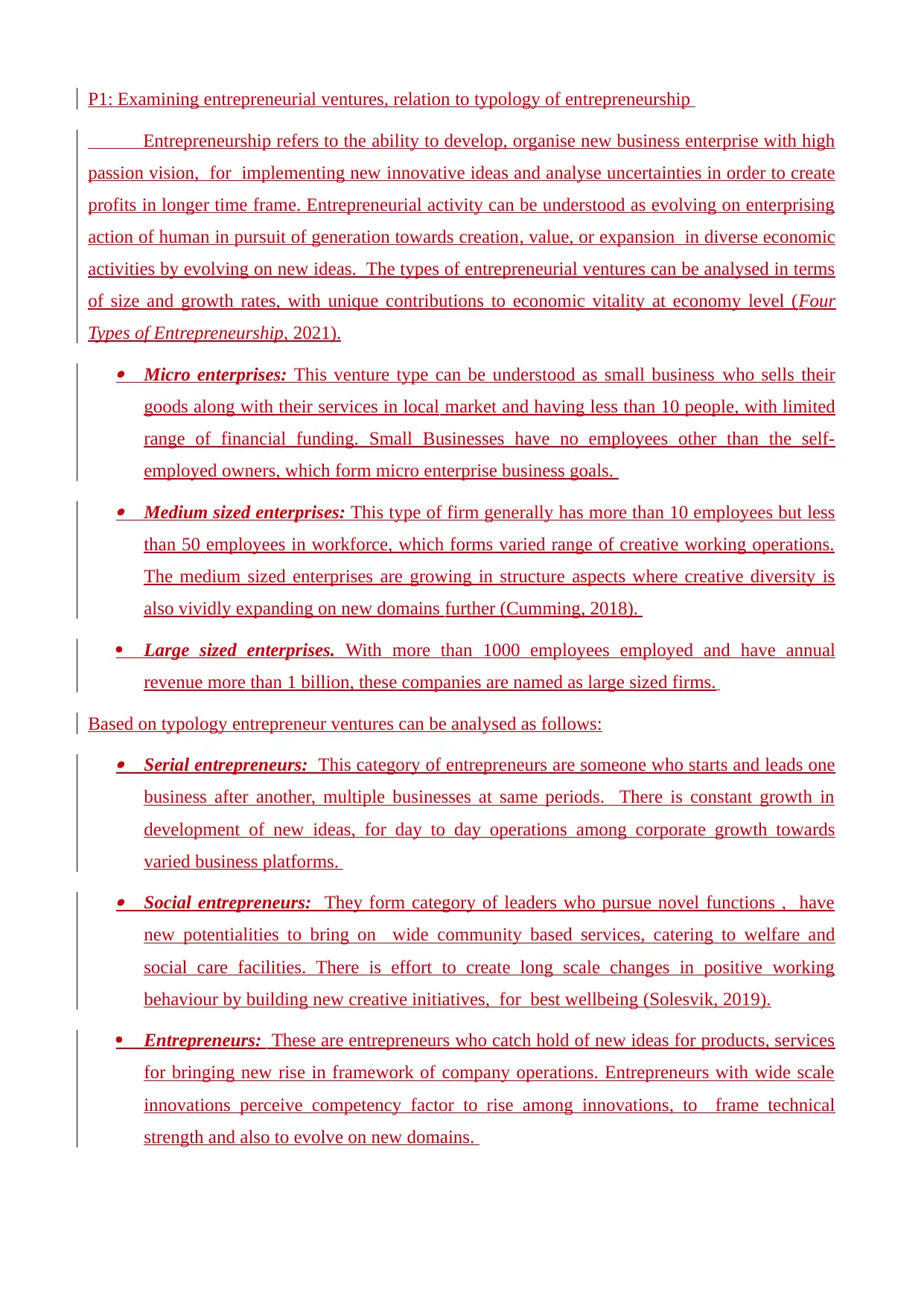
P1: Examining entrepreneurial ventures, relation to typology of entrepreneurship
Entrepreneurship refers to the ability to develop, organise new business enterprise with high
passion vision, for implementing new innovative ideas and analyse uncertainties in order to create
profits in longer time frame. Entrepreneurial activity can be understood as evolving on enterprising
action of human in pursuit of generation towards creation, value, or expansion in diverse economic
activities by evolving on new ideas. The types of entrepreneurial ventures can be analysed in terms
of size and growth rates, with unique contributions to economic vitality at economy level (Four
Types of Entrepreneurship, 2021).
Micro enterprises: This venture type can be understood as small business who sells their
goods along with their services in local market and having less than 10 people, with limited
range of financial funding. Small Businesses have no employees other than the self-
employed owners, which form micro enterprise business goals.
Medium sized enterprises: This type of firm generally has more than 10 employees but less
than 50 employees in workforce, which forms varied range of creative working operations.
The medium sized enterprises are growing in structure aspects where creative diversity is
also vividly expanding on new domains further (Cumming, 2018).
Large sized enterprises. With more than 1000 employees employed and have annual
revenue more than 1 billion, these companies are named as large sized firms.
Based on typology entrepreneur ventures can be analysed as follows:
Serial entrepreneurs: This category of entrepreneurs are someone who starts and leads one
business after another, multiple businesses at same periods. There is constant growth in
development of new ideas, for day to day operations among corporate growth towards
varied business platforms.
Social entrepreneurs: They form category of leaders who pursue novel functions , have
new potentialities to bring on wide community based services, catering to welfare and
social care facilities. There is effort to create long scale changes in positive working
behaviour by building new creative initiatives, for best wellbeing (Solesvik, 2019).
Entrepreneurs: These are entrepreneurs who catch hold of new ideas for products, services
for bringing new rise in framework of company operations. Entrepreneurs with wide scale
innovations perceive competency factor to rise among innovations, to frame technical
strength and also to evolve on new domains.
Entrepreneurship refers to the ability to develop, organise new business enterprise with high
passion vision, for implementing new innovative ideas and analyse uncertainties in order to create
profits in longer time frame. Entrepreneurial activity can be understood as evolving on enterprising
action of human in pursuit of generation towards creation, value, or expansion in diverse economic
activities by evolving on new ideas. The types of entrepreneurial ventures can be analysed in terms
of size and growth rates, with unique contributions to economic vitality at economy level (Four
Types of Entrepreneurship, 2021).
Micro enterprises: This venture type can be understood as small business who sells their
goods along with their services in local market and having less than 10 people, with limited
range of financial funding. Small Businesses have no employees other than the self-
employed owners, which form micro enterprise business goals.
Medium sized enterprises: This type of firm generally has more than 10 employees but less
than 50 employees in workforce, which forms varied range of creative working operations.
The medium sized enterprises are growing in structure aspects where creative diversity is
also vividly expanding on new domains further (Cumming, 2018).
Large sized enterprises. With more than 1000 employees employed and have annual
revenue more than 1 billion, these companies are named as large sized firms.
Based on typology entrepreneur ventures can be analysed as follows:
Serial entrepreneurs: This category of entrepreneurs are someone who starts and leads one
business after another, multiple businesses at same periods. There is constant growth in
development of new ideas, for day to day operations among corporate growth towards
varied business platforms.
Social entrepreneurs: They form category of leaders who pursue novel functions , have
new potentialities to bring on wide community based services, catering to welfare and
social care facilities. There is effort to create long scale changes in positive working
behaviour by building new creative initiatives, for best wellbeing (Solesvik, 2019).
Entrepreneurs: These are entrepreneurs who catch hold of new ideas for products, services
for bringing new rise in framework of company operations. Entrepreneurs with wide scale
innovations perceive competency factor to rise among innovations, to frame technical
strength and also to evolve on new domains.
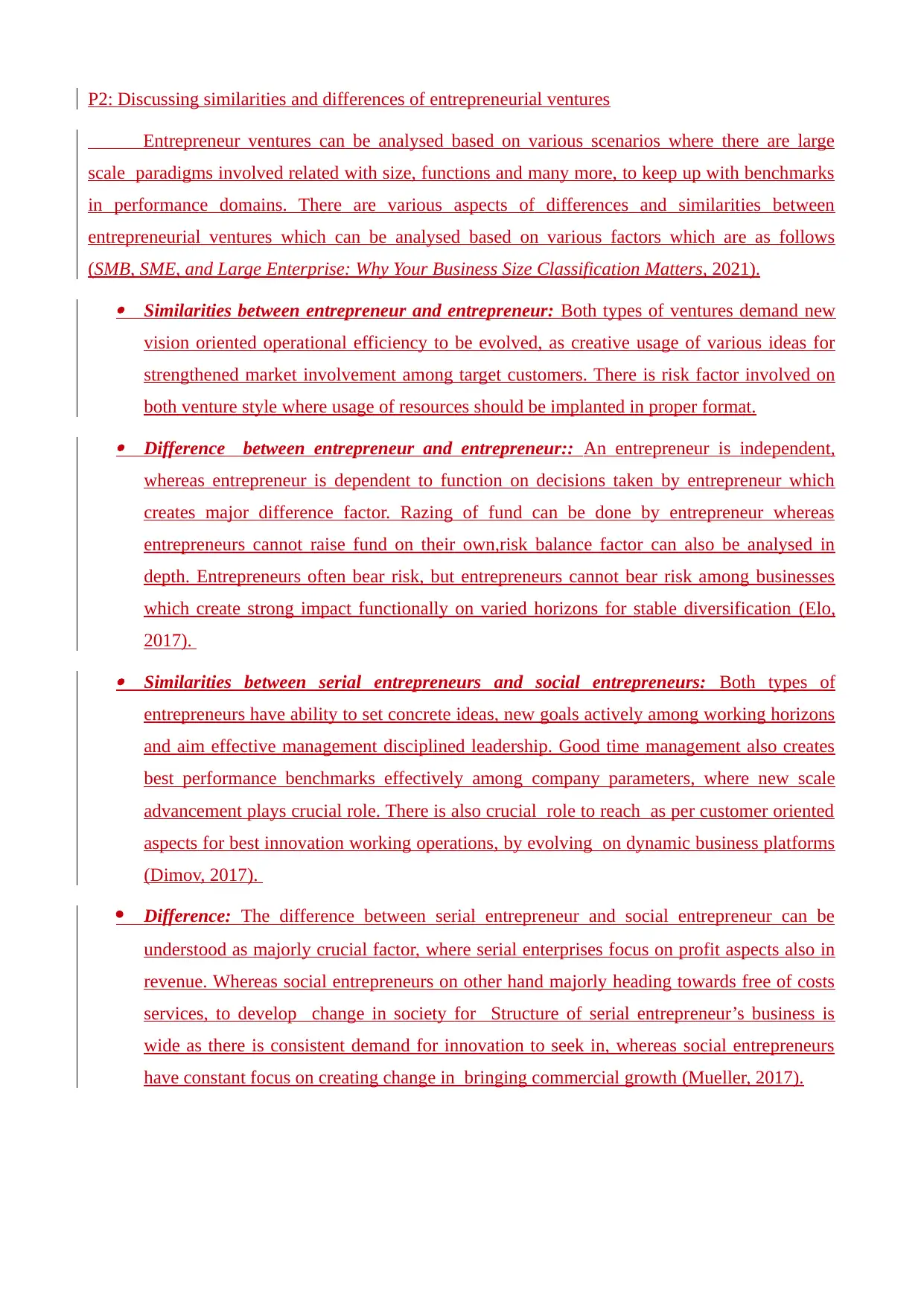
P2: Discussing similarities and differences of entrepreneurial ventures
Entrepreneur ventures can be analysed based on various scenarios where there are large
scale paradigms involved related with size, functions and many more, to keep up with benchmarks
in performance domains. There are various aspects of differences and similarities between
entrepreneurial ventures which can be analysed based on various factors which are as follows
(SMB, SME, and Large Enterprise: Why Your Business Size Classification Matters, 2021).
Similarities between entrepreneur and entrepreneur: Both types of ventures demand new
vision oriented operational efficiency to be evolved, as creative usage of various ideas for
strengthened market involvement among target customers. There is risk factor involved on
both venture style where usage of resources should be implanted in proper format.
Difference between entrepreneur and entrepreneur:: An entrepreneur is independent,
whereas entrepreneur is dependent to function on decisions taken by entrepreneur which
creates major difference factor. Razing of fund can be done by entrepreneur whereas
entrepreneurs cannot raise fund on their own,risk balance factor can also be analysed in
depth. Entrepreneurs often bear risk, but entrepreneurs cannot bear risk among businesses
which create strong impact functionally on varied horizons for stable diversification (Elo,
2017).
Similarities between serial entrepreneurs and social entrepreneurs: Both types of
entrepreneurs have ability to set concrete ideas, new goals actively among working horizons
and aim effective management disciplined leadership. Good time management also creates
best performance benchmarks effectively among company parameters, where new scale
advancement plays crucial role. There is also crucial role to reach as per customer oriented
aspects for best innovation working operations, by evolving on dynamic business platforms
(Dimov, 2017).
Difference: The difference between serial entrepreneur and social entrepreneur can be
understood as majorly crucial factor, where serial enterprises focus on profit aspects also in
revenue. Whereas social entrepreneurs on other hand majorly heading towards free of costs
services, to develop change in society for Structure of serial entrepreneur’s business is
wide as there is consistent demand for innovation to seek in, whereas social entrepreneurs
have constant focus on creating change in bringing commercial growth (Mueller, 2017).
Entrepreneur ventures can be analysed based on various scenarios where there are large
scale paradigms involved related with size, functions and many more, to keep up with benchmarks
in performance domains. There are various aspects of differences and similarities between
entrepreneurial ventures which can be analysed based on various factors which are as follows
(SMB, SME, and Large Enterprise: Why Your Business Size Classification Matters, 2021).
Similarities between entrepreneur and entrepreneur: Both types of ventures demand new
vision oriented operational efficiency to be evolved, as creative usage of various ideas for
strengthened market involvement among target customers. There is risk factor involved on
both venture style where usage of resources should be implanted in proper format.
Difference between entrepreneur and entrepreneur:: An entrepreneur is independent,
whereas entrepreneur is dependent to function on decisions taken by entrepreneur which
creates major difference factor. Razing of fund can be done by entrepreneur whereas
entrepreneurs cannot raise fund on their own,risk balance factor can also be analysed in
depth. Entrepreneurs often bear risk, but entrepreneurs cannot bear risk among businesses
which create strong impact functionally on varied horizons for stable diversification (Elo,
2017).
Similarities between serial entrepreneurs and social entrepreneurs: Both types of
entrepreneurs have ability to set concrete ideas, new goals actively among working horizons
and aim effective management disciplined leadership. Good time management also creates
best performance benchmarks effectively among company parameters, where new scale
advancement plays crucial role. There is also crucial role to reach as per customer oriented
aspects for best innovation working operations, by evolving on dynamic business platforms
(Dimov, 2017).
Difference: The difference between serial entrepreneur and social entrepreneur can be
understood as majorly crucial factor, where serial enterprises focus on profit aspects also in
revenue. Whereas social entrepreneurs on other hand majorly heading towards free of costs
services, to develop change in society for Structure of serial entrepreneur’s business is
wide as there is consistent demand for innovation to seek in, whereas social entrepreneurs
have constant focus on creating change in bringing commercial growth (Mueller, 2017).
⊘ This is a preview!⊘
Do you want full access?
Subscribe today to unlock all pages.

Trusted by 1+ million students worldwide
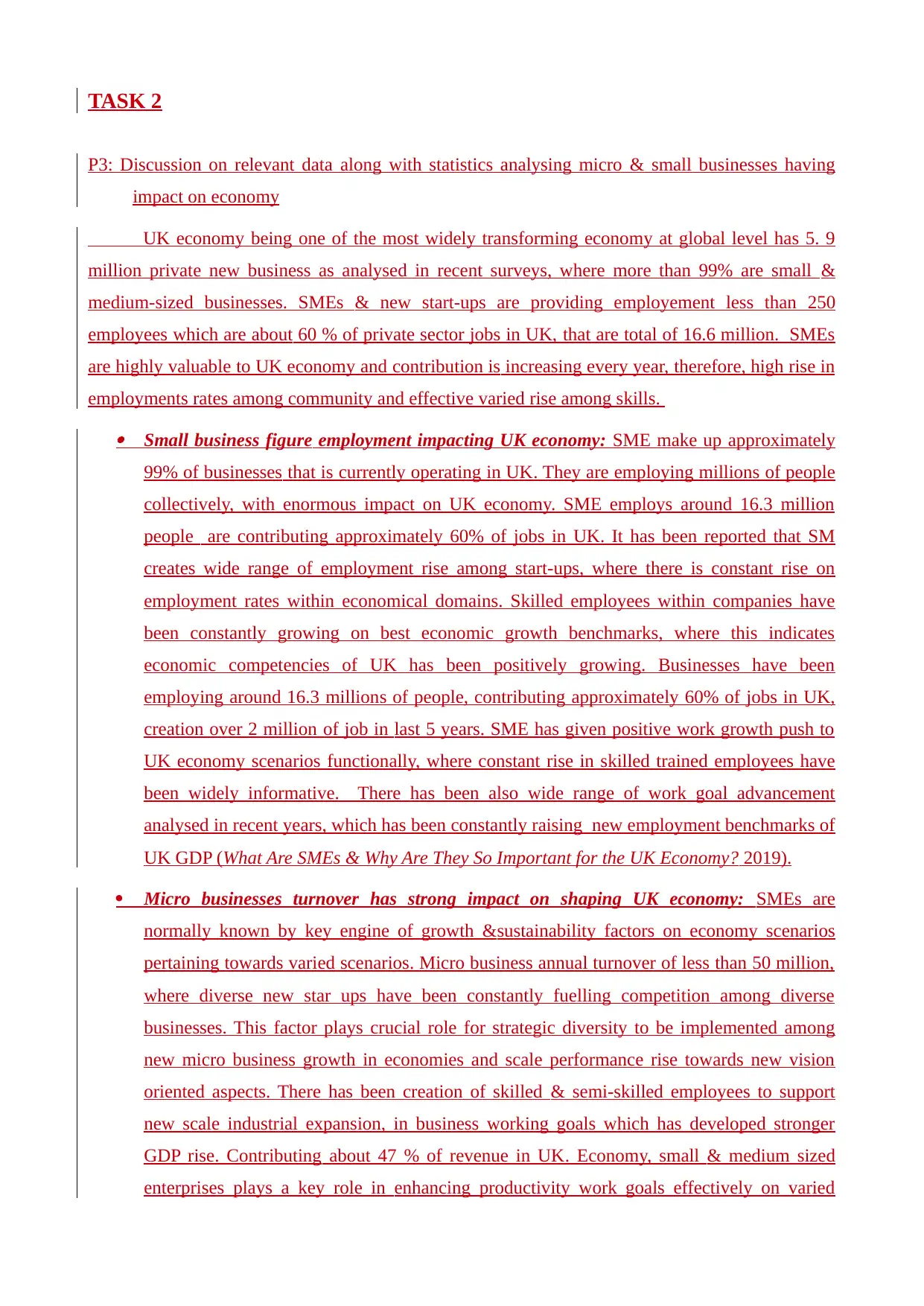
TASK 2
P3: Discussion on relevant data along with statistics analysing micro & small businesses having
impact on economy
UK economy being one of the most widely transforming economy at global level has 5. 9
million private new business as analysed in recent surveys, where more than 99% are small &
medium-sized businesses. SMEs & new start-ups are providing employement less than 250
employees which are about 60 % of private sector jobs in UK, that are total of 16.6 million. SMEs
are highly valuable to UK economy and contribution is increasing every year, therefore, high rise in
employments rates among community and effective varied rise among skills.
Small business figure employment impacting UK economy: SME make up approximately
99% of businesses that is currently operating in UK. They are employing millions of people
collectively, with enormous impact on UK economy. SME employs around 16.3 million
people are contributing approximately 60% of jobs in UK. It has been reported that SM
creates wide range of employment rise among start-ups, where there is constant rise on
employment rates within economical domains. Skilled employees within companies have
been constantly growing on best economic growth benchmarks, where this indicates
economic competencies of UK has been positively growing. Businesses have been
employing around 16.3 millions of people, contributing approximately 60% of jobs in UK,
creation over 2 million of job in last 5 years. SME has given positive work growth push to
UK economy scenarios functionally, where constant rise in skilled trained employees have
been widely informative. There has been also wide range of work goal advancement
analysed in recent years, which has been constantly raising new employment benchmarks of
UK GDP (What Are SMEs & Why Are They So Important for the UK Economy? 2019).
Micro businesses turnover has strong impact on shaping UK economy: SMEs are
normally known by key engine of growth &sustainability factors on economy scenarios
pertaining towards varied scenarios. Micro business annual turnover of less than 50 million,
where diverse new star ups have been constantly fuelling competition among diverse
businesses. This factor plays crucial role for strategic diversity to be implemented among
new micro business growth in economies and scale performance rise towards new vision
oriented aspects. There has been creation of skilled & semi-skilled employees to support
new scale industrial expansion, in business working goals which has developed stronger
GDP rise. Contributing about 47 % of revenue in UK. Economy, small & medium sized
enterprises plays a key role in enhancing productivity work goals effectively on varied
P3: Discussion on relevant data along with statistics analysing micro & small businesses having
impact on economy
UK economy being one of the most widely transforming economy at global level has 5. 9
million private new business as analysed in recent surveys, where more than 99% are small &
medium-sized businesses. SMEs & new start-ups are providing employement less than 250
employees which are about 60 % of private sector jobs in UK, that are total of 16.6 million. SMEs
are highly valuable to UK economy and contribution is increasing every year, therefore, high rise in
employments rates among community and effective varied rise among skills.
Small business figure employment impacting UK economy: SME make up approximately
99% of businesses that is currently operating in UK. They are employing millions of people
collectively, with enormous impact on UK economy. SME employs around 16.3 million
people are contributing approximately 60% of jobs in UK. It has been reported that SM
creates wide range of employment rise among start-ups, where there is constant rise on
employment rates within economical domains. Skilled employees within companies have
been constantly growing on best economic growth benchmarks, where this indicates
economic competencies of UK has been positively growing. Businesses have been
employing around 16.3 millions of people, contributing approximately 60% of jobs in UK,
creation over 2 million of job in last 5 years. SME has given positive work growth push to
UK economy scenarios functionally, where constant rise in skilled trained employees have
been widely informative. There has been also wide range of work goal advancement
analysed in recent years, which has been constantly raising new employment benchmarks of
UK GDP (What Are SMEs & Why Are They So Important for the UK Economy? 2019).
Micro businesses turnover has strong impact on shaping UK economy: SMEs are
normally known by key engine of growth &sustainability factors on economy scenarios
pertaining towards varied scenarios. Micro business annual turnover of less than 50 million,
where diverse new star ups have been constantly fuelling competition among diverse
businesses. This factor plays crucial role for strategic diversity to be implemented among
new micro business growth in economies and scale performance rise towards new vision
oriented aspects. There has been creation of skilled & semi-skilled employees to support
new scale industrial expansion, in business working goals which has developed stronger
GDP rise. Contributing about 47 % of revenue in UK. Economy, small & medium sized
enterprises plays a key role in enhancing productivity work goals effectively on varied
Paraphrase This Document
Need a fresh take? Get an instant paraphrase of this document with our AI Paraphraser
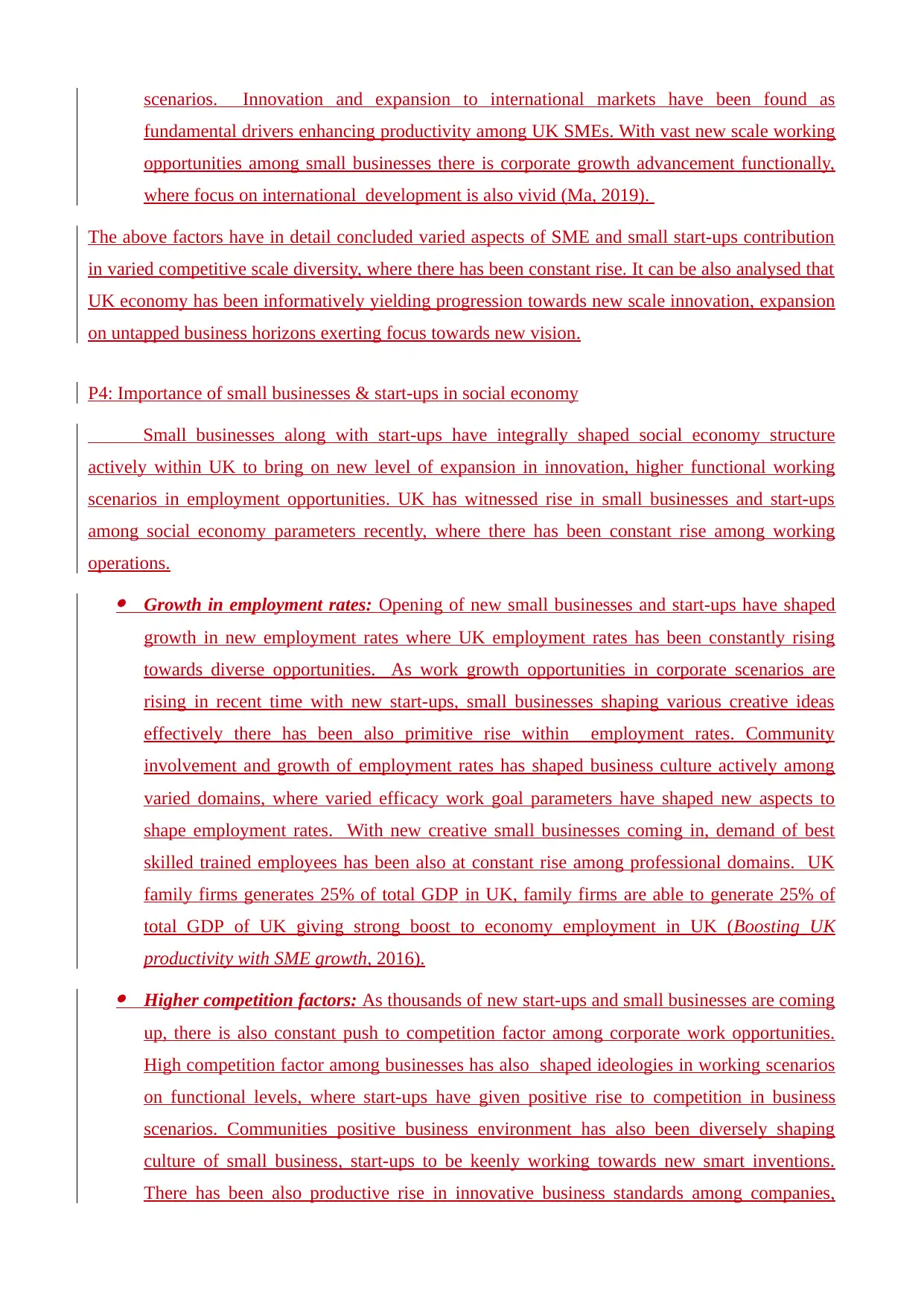
scenarios. Innovation and expansion to international markets have been found as
fundamental drivers enhancing productivity among UK SMEs. With vast new scale working
opportunities among small businesses there is corporate growth advancement functionally,
where focus on international development is also vivid (Ma, 2019).
The above factors have in detail concluded varied aspects of SME and small start-ups contribution
in varied competitive scale diversity, where there has been constant rise. It can be also analysed that
UK economy has been informatively yielding progression towards new scale innovation, expansion
on untapped business horizons exerting focus towards new vision.
P4: Importance of small businesses & start-ups in social economy
Small businesses along with start-ups have integrally shaped social economy structure
actively within UK to bring on new level of expansion in innovation, higher functional working
scenarios in employment opportunities. UK has witnessed rise in small businesses and start-ups
among social economy parameters recently, where there has been constant rise among working
operations.
Growth in employment rates: Opening of new small businesses and start-ups have shaped
growth in new employment rates where UK employment rates has been constantly rising
towards diverse opportunities. As work growth opportunities in corporate scenarios are
rising in recent time with new start-ups, small businesses shaping various creative ideas
effectively there has been also primitive rise within employment rates. Community
involvement and growth of employment rates has shaped business culture actively among
varied domains, where varied efficacy work goal parameters have shaped new aspects to
shape employment rates. With new creative small businesses coming in, demand of best
skilled trained employees has been also at constant rise among professional domains. UK
family firms generates 25% of total GDP in UK, family firms are able to generate 25% of
total GDP of UK giving strong boost to economy employment in UK (Boosting UK
productivity with SME growth, 2016).
Higher competition factors: As thousands of new start-ups and small businesses are coming
up, there is also constant push to competition factor among corporate work opportunities.
High competition factor among businesses has also shaped ideologies in working scenarios
on functional levels, where start-ups have given positive rise to competition in business
scenarios. Communities positive business environment has also been diversely shaping
culture of small business, start-ups to be keenly working towards new smart inventions.
There has been also productive rise in innovative business standards among companies,
fundamental drivers enhancing productivity among UK SMEs. With vast new scale working
opportunities among small businesses there is corporate growth advancement functionally,
where focus on international development is also vivid (Ma, 2019).
The above factors have in detail concluded varied aspects of SME and small start-ups contribution
in varied competitive scale diversity, where there has been constant rise. It can be also analysed that
UK economy has been informatively yielding progression towards new scale innovation, expansion
on untapped business horizons exerting focus towards new vision.
P4: Importance of small businesses & start-ups in social economy
Small businesses along with start-ups have integrally shaped social economy structure
actively within UK to bring on new level of expansion in innovation, higher functional working
scenarios in employment opportunities. UK has witnessed rise in small businesses and start-ups
among social economy parameters recently, where there has been constant rise among working
operations.
Growth in employment rates: Opening of new small businesses and start-ups have shaped
growth in new employment rates where UK employment rates has been constantly rising
towards diverse opportunities. As work growth opportunities in corporate scenarios are
rising in recent time with new start-ups, small businesses shaping various creative ideas
effectively there has been also primitive rise within employment rates. Community
involvement and growth of employment rates has shaped business culture actively among
varied domains, where varied efficacy work goal parameters have shaped new aspects to
shape employment rates. With new creative small businesses coming in, demand of best
skilled trained employees has been also at constant rise among professional domains. UK
family firms generates 25% of total GDP in UK, family firms are able to generate 25% of
total GDP of UK giving strong boost to economy employment in UK (Boosting UK
productivity with SME growth, 2016).
Higher competition factors: As thousands of new start-ups and small businesses are coming
up, there is also constant push to competition factor among corporate work opportunities.
High competition factor among businesses has also shaped ideologies in working scenarios
on functional levels, where start-ups have given positive rise to competition in business
scenarios. Communities positive business environment has also been diversely shaping
culture of small business, start-ups to be keenly working towards new smart inventions.
There has been also productive rise in innovative business standards among companies,

where competition among start-ups and new ethical fundamentals has shaped economy
(Nishizawa, 2018).
Rise in diversity of business opportunities: There has been instant rise in diversity of
business opportunities within UK economy, where factors such as less cost expenditure and
large economic push to opportunities have been found prominently on rise There are varied
aspects of creative work goal advancement, higher use towards innovative business
productivity which has been constantly on rise by new employability opportunities. Diverse
factors of varied scale business opportunities have been informatively rising on varied
platform in social economy, contributing to constant rise in GDP. (Eckhardt,2019).
(Nishizawa, 2018).
Rise in diversity of business opportunities: There has been instant rise in diversity of
business opportunities within UK economy, where factors such as less cost expenditure and
large economic push to opportunities have been found prominently on rise There are varied
aspects of creative work goal advancement, higher use towards innovative business
productivity which has been constantly on rise by new employability opportunities. Diverse
factors of varied scale business opportunities have been informatively rising on varied
platform in social economy, contributing to constant rise in GDP. (Eckhardt,2019).
⊘ This is a preview!⊘
Do you want full access?
Subscribe today to unlock all pages.

Trusted by 1+ million students worldwide
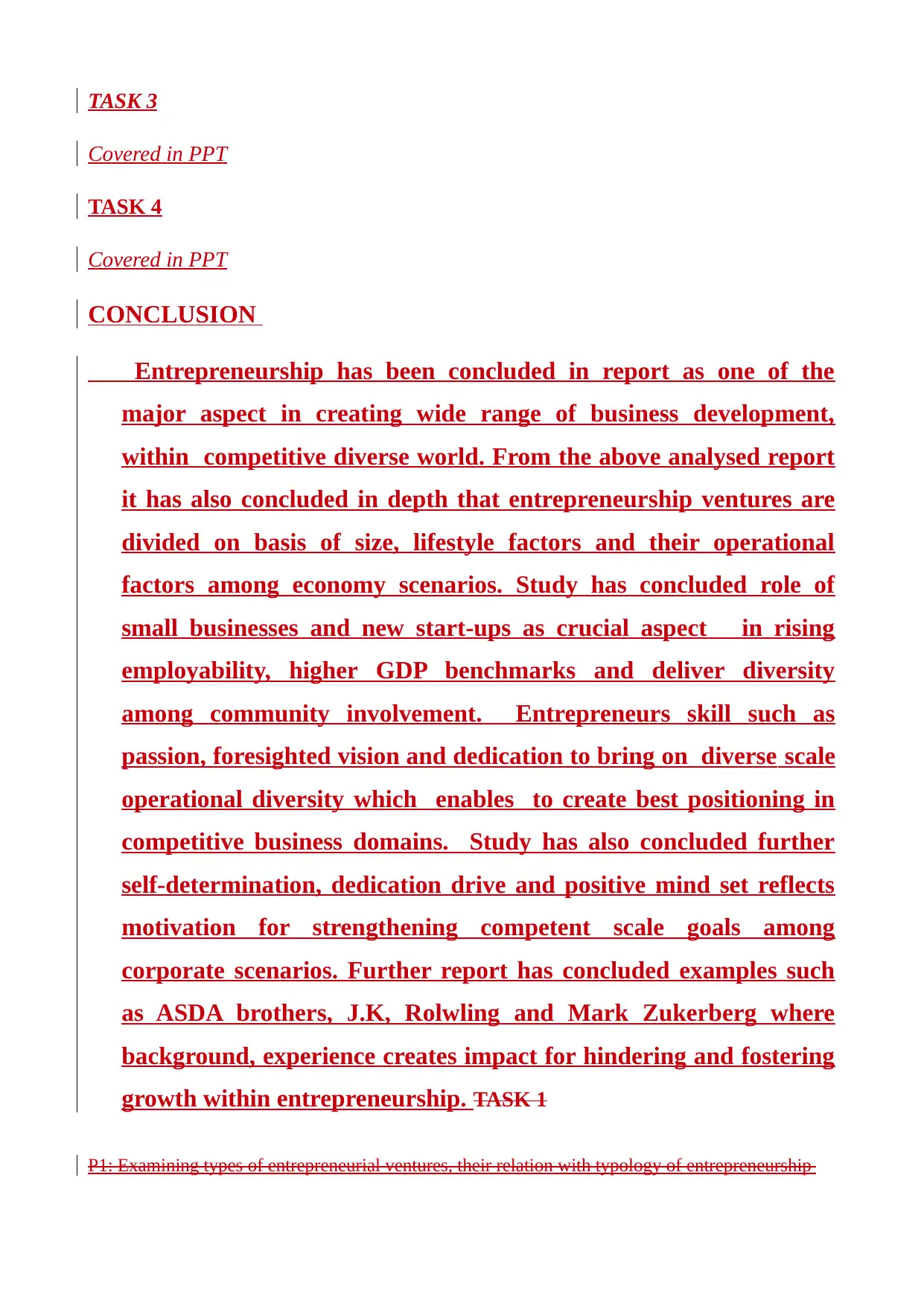
TASK 3
Covered in PPT
TASK 4
Covered in PPT
CONCLUSION
Entrepreneurship has been concluded in report as one of the
major aspect in creating wide range of business development,
within competitive diverse world. From the above analysed report
it has also concluded in depth that entrepreneurship ventures are
divided on basis of size, lifestyle factors and their operational
factors among economy scenarios. Study has concluded role of
small businesses and new start-ups as crucial aspect in rising
employability, higher GDP benchmarks and deliver diversity
among community involvement. Entrepreneurs skill such as
passion, foresighted vision and dedication to bring on diverse scale
operational diversity which enables to create best positioning in
competitive business domains. Study has also concluded further
self-determination, dedication drive and positive mind set reflects
motivation for strengthening competent scale goals among
corporate scenarios. Further report has concluded examples such
as ASDA brothers, J.K, Rolwling and Mark Zukerberg where
background, experience creates impact for hindering and fostering
growth within entrepreneurship. TASK 1
P1: Examining types of entrepreneurial ventures, their relation with typology of entrepreneurship
Covered in PPT
TASK 4
Covered in PPT
CONCLUSION
Entrepreneurship has been concluded in report as one of the
major aspect in creating wide range of business development,
within competitive diverse world. From the above analysed report
it has also concluded in depth that entrepreneurship ventures are
divided on basis of size, lifestyle factors and their operational
factors among economy scenarios. Study has concluded role of
small businesses and new start-ups as crucial aspect in rising
employability, higher GDP benchmarks and deliver diversity
among community involvement. Entrepreneurs skill such as
passion, foresighted vision and dedication to bring on diverse scale
operational diversity which enables to create best positioning in
competitive business domains. Study has also concluded further
self-determination, dedication drive and positive mind set reflects
motivation for strengthening competent scale goals among
corporate scenarios. Further report has concluded examples such
as ASDA brothers, J.K, Rolwling and Mark Zukerberg where
background, experience creates impact for hindering and fostering
growth within entrepreneurship. TASK 1
P1: Examining types of entrepreneurial ventures, their relation with typology of entrepreneurship
Paraphrase This Document
Need a fresh take? Get an instant paraphrase of this document with our AI Paraphraser
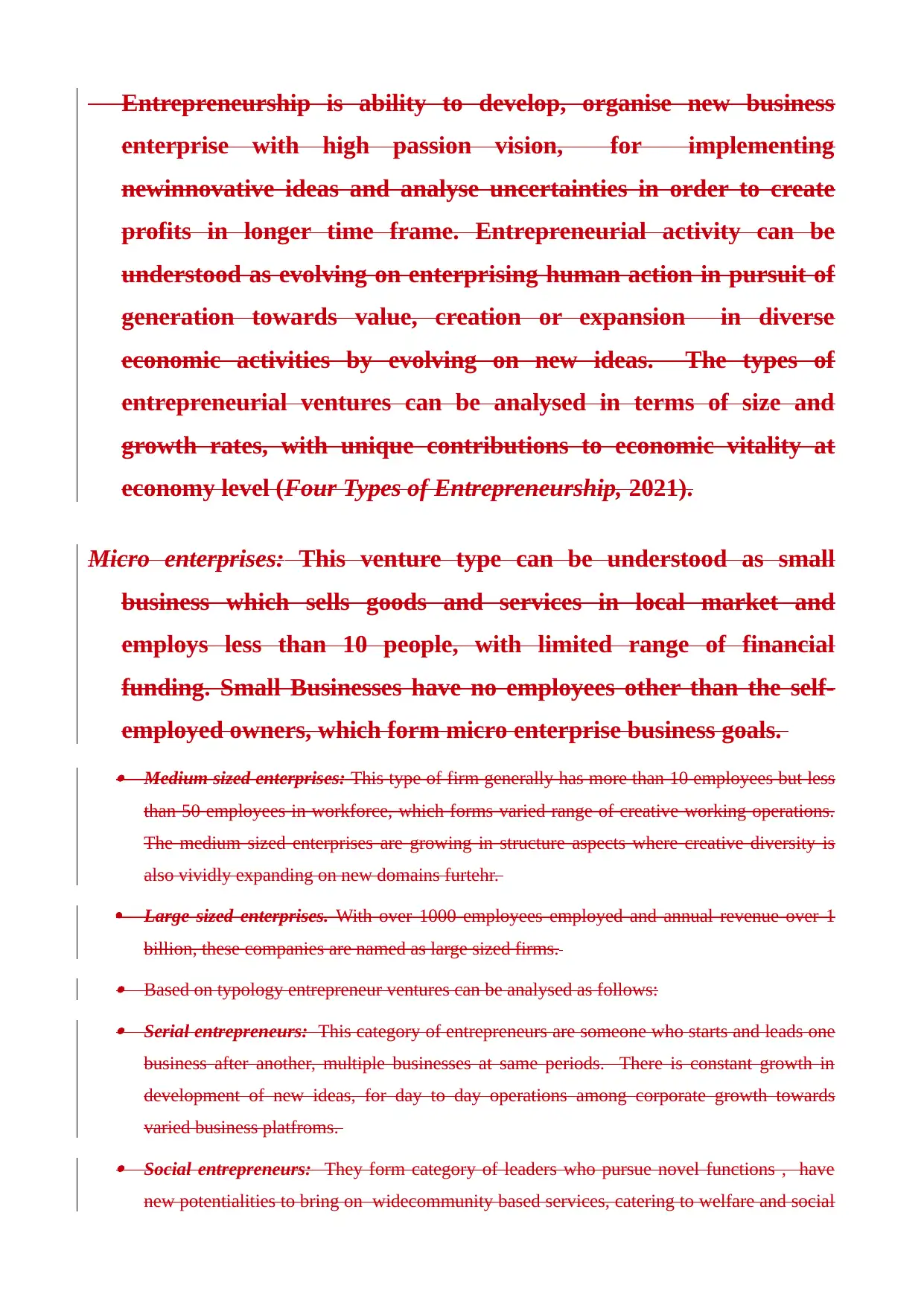
Entrepreneurship is ability to develop, organise new business
enterprise with high passion vision, for implementing
newinnovative ideas and analyse uncertainties in order to create
profits in longer time frame. Entrepreneurial activity can be
understood as evolving on enterprising human action in pursuit of
generation towards value, creation or expansion in diverse
economic activities by evolving on new ideas. The types of
entrepreneurial ventures can be analysed in terms of size and
growth rates, with unique contributions to economic vitality at
economy level (Four Types of Entrepreneurship, 2021).
Micro enterprises: This venture type can be understood as small
business which sells goods and services in local market and
employs less than 10 people, with limited range of financial
funding. Small Businesses have no employees other than the self-
employed owners, which form micro enterprise business goals.
Medium sized enterprises: This type of firm generally has more than 10 employees but less
than 50 employees in workforce, which forms varied range of creative working operations.
The medium sized enterprises are growing in structure aspects where creative diversity is
also vividly expanding on new domains furtehr.
Large sized enterprises. With over 1000 employees employed and annual revenue over 1
billion, these companies are named as large sized firms.
Based on typology entrepreneur ventures can be analysed as follows:
Serial entrepreneurs: This category of entrepreneurs are someone who starts and leads one
business after another, multiple businesses at same periods. There is constant growth in
development of new ideas, for day to day operations among corporate growth towards
varied business platfroms.
Social entrepreneurs: They form category of leaders who pursue novel functions , have
new potentialities to bring on widecommunity based services, catering to welfare and social
enterprise with high passion vision, for implementing
newinnovative ideas and analyse uncertainties in order to create
profits in longer time frame. Entrepreneurial activity can be
understood as evolving on enterprising human action in pursuit of
generation towards value, creation or expansion in diverse
economic activities by evolving on new ideas. The types of
entrepreneurial ventures can be analysed in terms of size and
growth rates, with unique contributions to economic vitality at
economy level (Four Types of Entrepreneurship, 2021).
Micro enterprises: This venture type can be understood as small
business which sells goods and services in local market and
employs less than 10 people, with limited range of financial
funding. Small Businesses have no employees other than the self-
employed owners, which form micro enterprise business goals.
Medium sized enterprises: This type of firm generally has more than 10 employees but less
than 50 employees in workforce, which forms varied range of creative working operations.
The medium sized enterprises are growing in structure aspects where creative diversity is
also vividly expanding on new domains furtehr.
Large sized enterprises. With over 1000 employees employed and annual revenue over 1
billion, these companies are named as large sized firms.
Based on typology entrepreneur ventures can be analysed as follows:
Serial entrepreneurs: This category of entrepreneurs are someone who starts and leads one
business after another, multiple businesses at same periods. There is constant growth in
development of new ideas, for day to day operations among corporate growth towards
varied business platfroms.
Social entrepreneurs: They form category of leaders who pursue novel functions , have
new potentialities to bring on widecommunity based services, catering to welfare and social
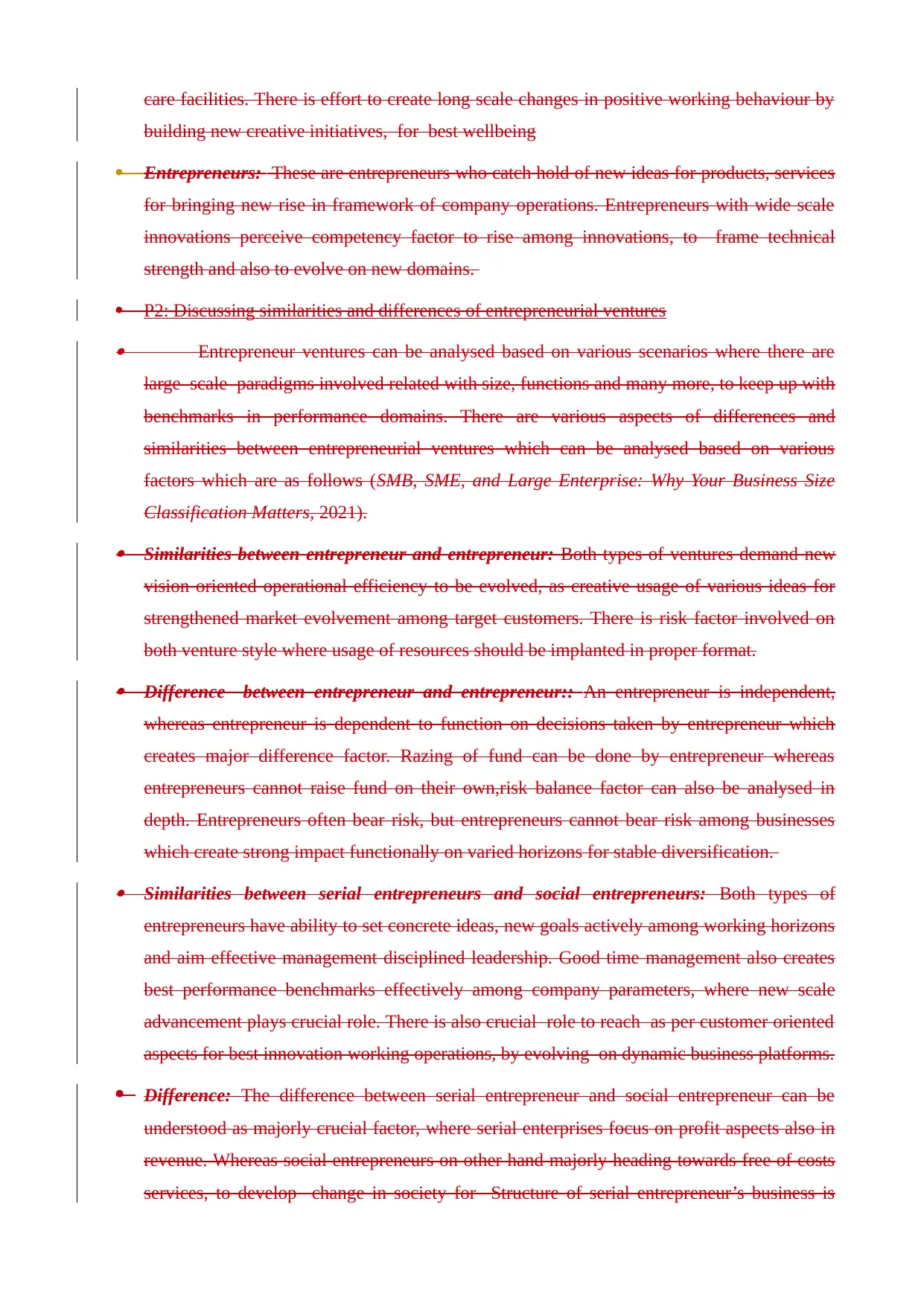
care facilities. There is effort to create long scale changes in positive working behaviour by
building new creative initiatives, for best wellbeing
Entrepreneurs: These are entrepreneurs who catch hold of new ideas for products, services
for bringing new rise in framework of company operations. Entrepreneurs with wide scale
innovations perceive competency factor to rise among innovations, to frame technical
strength and also to evolve on new domains.
P2: Discussing similarities and differences of entrepreneurial ventures
Entrepreneur ventures can be analysed based on various scenarios where there are
large scale paradigms involved related with size, functions and many more, to keep up with
benchmarks in performance domains. There are various aspects of differences and
similarities between entrepreneurial ventures which can be analysed based on various
factors which are as follows (SMB, SME, and Large Enterprise: Why Your Business Size
Classification Matters, 2021).
Similarities between entrepreneur and entrepreneur: Both types of ventures demand new
vision oriented operational efficiency to be evolved, as creative usage of various ideas for
strengthened market evolvement among target customers. There is risk factor involved on
both venture style where usage of resources should be implanted in proper format.
Difference between entrepreneur and entrepreneur:: An entrepreneur is independent,
whereas entrepreneur is dependent to function on decisions taken by entrepreneur which
creates major difference factor. Razing of fund can be done by entrepreneur whereas
entrepreneurs cannot raise fund on their own,risk balance factor can also be analysed in
depth. Entrepreneurs often bear risk, but entrepreneurs cannot bear risk among businesses
which create strong impact functionally on varied horizons for stable diversification.
Similarities between serial entrepreneurs and social entrepreneurs: Both types of
entrepreneurs have ability to set concrete ideas, new goals actively among working horizons
and aim effective management disciplined leadership. Good time management also creates
best performance benchmarks effectively among company parameters, where new scale
advancement plays crucial role. There is also crucial role to reach as per customer oriented
aspects for best innovation working operations, by evolving on dynamic business platforms.
Difference: The difference between serial entrepreneur and social entrepreneur can be
understood as majorly crucial factor, where serial enterprises focus on profit aspects also in
revenue. Whereas social entrepreneurs on other hand majorly heading towards free of costs
services, to develop change in society for Structure of serial entrepreneur’s business is
building new creative initiatives, for best wellbeing
Entrepreneurs: These are entrepreneurs who catch hold of new ideas for products, services
for bringing new rise in framework of company operations. Entrepreneurs with wide scale
innovations perceive competency factor to rise among innovations, to frame technical
strength and also to evolve on new domains.
P2: Discussing similarities and differences of entrepreneurial ventures
Entrepreneur ventures can be analysed based on various scenarios where there are
large scale paradigms involved related with size, functions and many more, to keep up with
benchmarks in performance domains. There are various aspects of differences and
similarities between entrepreneurial ventures which can be analysed based on various
factors which are as follows (SMB, SME, and Large Enterprise: Why Your Business Size
Classification Matters, 2021).
Similarities between entrepreneur and entrepreneur: Both types of ventures demand new
vision oriented operational efficiency to be evolved, as creative usage of various ideas for
strengthened market evolvement among target customers. There is risk factor involved on
both venture style where usage of resources should be implanted in proper format.
Difference between entrepreneur and entrepreneur:: An entrepreneur is independent,
whereas entrepreneur is dependent to function on decisions taken by entrepreneur which
creates major difference factor. Razing of fund can be done by entrepreneur whereas
entrepreneurs cannot raise fund on their own,risk balance factor can also be analysed in
depth. Entrepreneurs often bear risk, but entrepreneurs cannot bear risk among businesses
which create strong impact functionally on varied horizons for stable diversification.
Similarities between serial entrepreneurs and social entrepreneurs: Both types of
entrepreneurs have ability to set concrete ideas, new goals actively among working horizons
and aim effective management disciplined leadership. Good time management also creates
best performance benchmarks effectively among company parameters, where new scale
advancement plays crucial role. There is also crucial role to reach as per customer oriented
aspects for best innovation working operations, by evolving on dynamic business platforms.
Difference: The difference between serial entrepreneur and social entrepreneur can be
understood as majorly crucial factor, where serial enterprises focus on profit aspects also in
revenue. Whereas social entrepreneurs on other hand majorly heading towards free of costs
services, to develop change in society for Structure of serial entrepreneur’s business is
⊘ This is a preview!⊘
Do you want full access?
Subscribe today to unlock all pages.

Trusted by 1+ million students worldwide
1 out of 22
Related Documents
Your All-in-One AI-Powered Toolkit for Academic Success.
+13062052269
info@desklib.com
Available 24*7 on WhatsApp / Email
![[object Object]](/_next/static/media/star-bottom.7253800d.svg)
Unlock your academic potential
Copyright © 2020–2025 A2Z Services. All Rights Reserved. Developed and managed by ZUCOL.





